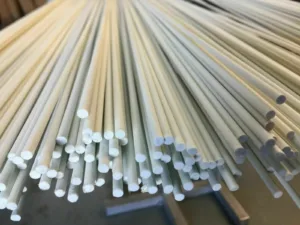You can buy fiberglass rods at several types of places, depending on what you need them for:

where to buy fiberglass rods
Hardware Stores: Local hardware stores often carry a selection of fiberglass rods suitable for general home and garden uses. Big chains like Home Depot, Lowe’s, and Ace Hardware are good places to check.
Specialty Construction Supply Stores: These stores offer materials for more specific or industrial applications, including larger or more durable fiberglass rods.
Online Retailers: Websites like Amazon, eBay, or Alibaba can offer a wide variety of fiberglass rods in different sizes and quantities. This can be a convenient option if you know exactly what specifications you need.
Hobby and Craft Stores: For smaller and thinner fiberglass rods, which are often used in hobbies and crafts, check out local or online hobby stores.
Manufacturers and Wholesalers: If you need a large quantity or specific types of fiberglass rods, you might consider buying directly from manufacturers or wholesalers, like Unicomposite. This often requires a larger order but can reduce the cost per unit.
Choosing the right fiberglass rod involves considering several key factors to ensure it meets the specific requirements of your project. Here are the main aspects to think about:
Diameter and Thickness: The diameter of the rod will impact its strength and flexibility. Thicker rods are generally stronger and less flexible, which is important if they need to support more weight or withstand force. Thinner rods are more flexible and easier to manipulate, which might be necessary for certain applications.
Length: Consider the length of the rod you need. Fiberglass rods can usually be cut to size, but it’s efficient to buy a length close to what you need to minimize waste.
Flexibility: Depending on the application, you might need a rod that is very flexible or one that maintains rigidity under stress. The composition and design of the fiberglass rod (such as the weave of the fiberglass and the type of resin used) can affect its flexibility.
Strength and Load Capacity: Evaluate the load the rod needs to bear. Different types of fiberglass rods have varying tensile strengths, so choose one that can handle the mechanical demands of your project.
Corrosion Resistance: Fiberglass is naturally resistant to corrosion, making it ideal for outdoor or harsh environmental conditions. However, the quality of the resin can affect its resistance to UV light and chemicals, so consider this if the rod will be exposed to such elements.
Environmental and Chemical Resistance: If the rod will be exposed to chemicals, extreme temperatures, or other harsh environmental conditions, ensure the resin used in the fiberglass is suitable for these conditions.
Color and Aesthetics: Some projects may require a specific color or aesthetic. Fiberglass rods can be found in various colors, which can be beneficial for matching them to the project’s design.
Cost: Finally, consider your budget. Fiberglass rods are generally cost-effective, but prices can vary based on the specifications and the quantity you are buying.
By considering these factors, you can choose a fiberglass rod that suits your needs effectively. If you’re unsure, it can be helpful to consult with a manufacturer or a specialist to discuss the specific requirements of your project.




























